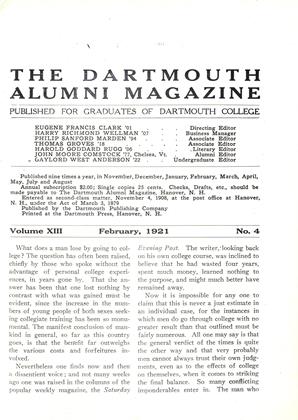The following ballad was sent to the MAGAZINE by Mr. A. B. Wilson '95 of Hartford, Conn., in response to a request from the editor of the MAGAZINE. His description of the origin of the ballad, so far as he knows it, follows :
I enclose herewith the words of the old song about which I talked with you last month. I will tell you all I know about their origin. My father was born in 1849 in the town of Pomfret, Vt. He lived in that town until he was sixteen years old. During the winter when he was nine years old he was frequently at the house of one of his neighbors, where lived a Mrs. Carpenter. As nearly as I can learn, Mrs. Carpenter was at that time about fifty years old, and she taught my father both the words and melody during that winter. My father remembers nothing further about the origin of the words or the music, but he has the impression that Mrs. Carpenter learned them when she was a young girl. The melody is very simple and the succession of the intervals is what is now termed old fashioned. The last two lines of each stanza are repeated in the nature of a chorus. It is difficult to determine with any degree of accuracy as to what period of time the incidents mentioned in the story have taken place, but it would seem to be prior to, and during the Revolution. It may be the College has some ancient records which may show sufficient to identify, with some degree of probability, who Strong Bow was. It may be the whole thing is merely an imagination of someone's brain, but it may be that there was foundation in fact which has taken the form of tradition. At any rate, it will be of interest to you, and you are permitted to use it in any way which you think best. It is enough, at least, to set one's thoughts speculating upon the days of Eleazar Wheelock and the students which he had during the years of his struggle to establish the college, and the constituency from which the students of that time came.
STRONG BOW
To Dartmouth's scientific halls In the olden time there came A sprightly red boy from the woods And Strong Bow was his name.
He had heard much of book-land skill, The white-man's pride and boast, And an ardent wish that skill to gain Was on his mind engrossed.
And soon he learned that white man's tongue To read and write and speak.
And soon by diligence was skilled In Latin, Lore and Greek.
In liberal arts and sciences With white boys he kept pace.
And few there were who ridiculed The color of his face.
But there was one New England youth Proud, overbearing, rude, Who oft upon poor Strong Bow's peace Did cruelly intrude.
But when assailed by treatment base The red boy simply said:
"The time will yet arrive when you Will ask and need my aid."
Four studious years rolled quickly by On the rapid wheels of time.
The red boy to his nation went In a far and western clime.
The white boy, too, his parents sought Down by Atlantic's shore And little did he dream he ere would see His tawny classmate more.
When he'd to sturdy manhood grown A Captain he became.
When the loud trump of War did sound, Then kindled was his frame.
When Britain proud essayed to rule Against the freeman's right, They chose the redmen on their side And armed them for a fight.
A battle long and fierce was fought Between the whites and reds And many a hero was laid low Upon his gory bed.
The red men gained the victory; The captain prisoner seized; And him with many a taunting threat They partially did tease.
An awful council was convened The prisoner's case to try, And to atone for warriors slain They sentenced him to die.
The death announcing dance they join And fain the Death song sing When boldly stepped their Sachem forth To the center of the ring.
"Don't you know me, sir," he said, "View carefully my face."
"I know you not," was the reply, "But I humbly beg for grace."
"You knew me once," the chief rejoined, "And you shall know again.
I am Strong Bow on whom cruelly You oft inflicted pain."
"Strong Bow brave chief, it is with shame That I confess the truth, But then you know it was the fault Of unreflecting youth.
Strong Bow, brave chief, I fear not to die, But for my loving wife, My parents and my children dear, I humbly beg for life."
"Although the Indian can't forget He freely can forgive.
At liberty the white man set. Pray, comrades, let him live."
"Although the Indian can't forget He freely can forgive At liberty the white man set.
Pray, comrades, let him live."
 View Full Issue
View Full Issue
More From This Issue
-
 Article
ArticleWhat does a man lose by going to college ?
February 1921 -
 Article
ArticlePEN AND CAMERA SKETCHES OF HANOVER AND THE COLLEGE BEFORE THE CENTENNIAL
February 1921 By EDWIN J. BARTLETT, '72 -
 Sports
SportsBASKETBALL
February 1921 -
 Article
ArticleTHE LOG OF THE DARTMOUTH OUTING CLUB
February 1921 By LELAND GRIGGS '02 -
 Sports
SportsHOCKEY
February 1921 -
 Article
ArticleA DARTMOUTH PIONEER
February 1921
Letters to the Editor
-
 Letters to the Editor
Letters to the EditorSOME DARTMOUTH LETTERS OF 100 YEARS AGO
December, 1922 -
 Letters to the Editor
Letters to the EditorLetters to the Editor
MARCH 1930 -
 Letters to the Editor
Letters to the EditorLETTERS TO THE EDITOR
FEBRUARY 1963 -
 Letters to the Editor
Letters to the EditorLetters to the Editor
October 1976 -
 Letters to the Editor
Letters to the EditorDiana's Story
MARCH 1999 -
 Letters to the Editor
Letters to the EditorLetters
Nov/Dec 2001


